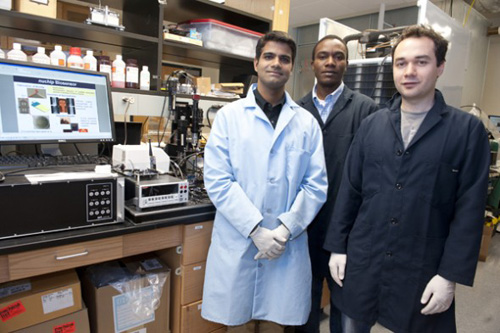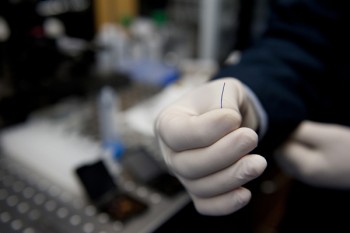In the last two decades, the number of deaths from colorectal cancer has steadily declined, according to the American Cancer Society. While some of the decrease can be attributed to better treatment practices, early detection is another primary factor. Nonetheless, colorectal cancer is still the second leading cause of death among men and women in the U.S., and is expected to be responsible for more than 50,000 deaths in 2012.

“Each of us has witnessed cancer in our home,” said pharmaceutical sciences graduate student Jaydev Upponi, who has helped design a new technology to “give back, to contribute science that could help in the long run.”
Upponi and his classmates, electrical and computer engineering graduate student Asanterabi Malima and mechanical engineering graduate student Cihan Yilmaz, recently founded a company to develop a screening chip that uses nanoparticles to detect colorectal cancer earlier than currently possible.
Current detection and monitoring strategies include expensive and often inaccurate tests such as a colonoscopy, the success of which depends on the competency of the examiner. An emerging screening assay, on the other hand, analyzes blood samples for a cancer-specific protein called carcinoembryonic antigen, or CEA. But current CEA screens have high thresholds and require large blood volumes and significant blood sample preparation, which make them expensive, time consuming and less sensitive.
“We saw that we have a technology that can address some of these concerns for diagnosis and monitoring,” said Malima, a member of Northeastern’s NSF-funded Center for High-rate Nanomanufacturing.
Using their expertise acquired in the labs of Ahmed Busnaina, the William Lincoln Smith Professor of Mechanical and Industrial Engineering, and Vladimir Torchilin, a Distinguished Professor of Pharmaceutical Sciences, the student-researchers developed a 0.25-millimeter chip that can detect very low concentrations of biomarkers in the blood such as CEA.

“First we coat nanoparticles with CEA-specific antibodies,” Yilmaz said of the design process. “Then we assemble the nanoparticles onto the chip.”
The antibodies bind to CEA, the amount of which will determine whether blood concentration levels are above normal.
The team will initially use the device to monitor patients who are already being treated for colorectal cancer. “Monitoring is a way to see if their treatment is effective or not. It can be extremely crucial especially in rapidly growing colorectal cancers, to detect increases in the biomarker,” Upponi said. “I think that’s one area where our device can be extremely beneficial.”
The data the researchers collect from these monitoring studies will allow them to establish guidelines for using the chip to diagnose cancer in the future. “Part of our work right now is answering questions like ‘What should be our clinical sensitivity and specificity?’” Malima said.
Because the chip can be engineered to detect a variety of biomarkers at once (by using a variety of antibodies to coat the nanoparticles), the technology could also be very useful in the emerging field of personalized medicine, using nuchip devices designed for specific populations. Three Northeastern student-researchers have developed a screening chip that uses nanoparticles to detect colorectal cancer earlier than ever before. Three Northeastern student-researchers have developed a screening chip that uses nanoparticles to detect colorectal cancer earlier than ever before.
Source: news@Northeastern
